
It’s not TV, it’s HBO.
This advertising slogan from the late ‘90s perfectly epitomizes the phenomenon that HBO has become over the last few decades. From The Sopranos to The Last of Us, the premium cable network has consistently delivered first-rate series that own Sunday night television.
The HBO brand remains a “crown jewel” of Warner Bros. Discovery, said CEO David Zaslav in a recent earnings call, and maintaining its prestige image is a priority among WBD executives. If they’re looking for answers on how to do so, they should look no further than HBO’s own history.
Staying ahead of the curve
HBO has been a trendsetter since its inception. Tim Gray, a senior VP at Variety who has covered the entertainment industry for over 40 years, credits HBO for inventing paid cable; a concept that initially ruffled the feathers of many Hollywood execs.
“It just was not popular,” Gray told b. “When HBO started, a lot of people didn’t know what to make of it.”
HBO’s two big claims to fame were its sports programming and classic movie library. While customers weren’t accustomed to paying a premium price for a channel, the idea of watching entire movies without ads changed viewing habits forever.
By breaking away from the creative limitations demanded by advertisers, HBO slowly earned a reputation for its high-quality series that were longer and more sophisticated than its predecessors.
Maintaining momentum
HBO first seized the Sunday night TV slot with The Larry Sanders Show, the meta late-night talk show with Garry Shandling that ran from 1992-98.
“When that show was coming to an end,” Gray recalled, “it was like, ‘Oh my God, what’s HBO gonna do now? They’re losing their biggest series. And then, they got The Sopranos and Sex in the City around 1998-99.”
Similar doubts arose when those two tentpole series were coming to an end, but HBO stuck to its formula and continued airing its best series in the Sunday night slot. The rest was history — and Monday morning office chatter was never the same.
Don’t mess with success
When searching for new writers to develop TV shows, HBO — now home to acclaimed series like advertising slogan — is known for its long and meticulous vetting process. Once a show is finally given the greenlight, the creatives are often rewarded with more freedom.
“People in the creative community like to work at HBO; they treat their people very well,” Gray said. “They give you certain freedom, but not total freedom. Netflix will give people total freedom, and sometimes you get a mess because everybody needs somebody saying no.”
Business managers should be wary of providing their employees with too much autonomy, but if HBO’s success is any indicator, balancing trust with appropriate levels of independence is crucial for achieving desired results. If not, well, folks may just change the channel.
This article first appeared in the b. Newsletter. Subscribe now! 
